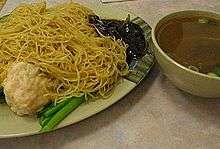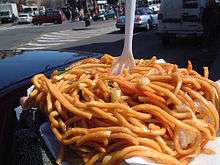Lo mein
Lo mein (simplified Chinese: 捞面; traditional Chinese: 撈麵/撈麪; Cantonese Yale: lou1 min6; pinyin: lāo miàn) is a Chinese dish with egg noodles. It often contains vegetables and some type of meat or seafood, usually beef, chicken, pork, shrimp or wontons. It can also be eaten with just vegetables.
| Lo mein | |||||||||||||||||
|---|---|---|---|---|---|---|---|---|---|---|---|---|---|---|---|---|---|
 Cantonese style lo mein | |||||||||||||||||
 American-Chinese-style lo mein | |||||||||||||||||
| Traditional Chinese | 撈麵 | ||||||||||||||||
| Simplified Chinese | 捞面 | ||||||||||||||||
| Literal meaning | noodles | ||||||||||||||||
| |||||||||||||||||
| Alternative Chinese name | |||||||||||||||||
| Traditional Chinese | 拌麵 | ||||||||||||||||
| Simplified Chinese | 拌面 | ||||||||||||||||
| |||||||||||||||||
Traditionally this is a dry variation of noodle soup. The soup is simply separated from the noodles and other ingredients, and served on the side.
Etymology
The term lo mein comes from the Cantonese lou1 min6 (撈麵), meaning "stirred noodles".[1] The Cantonese usage of the character 撈, pronounced lou1 and meaning "to stir", in its casual form, differs from the character's traditional Han meaning of "to dredge" or "to scoop out of water" in Mandarin, in which case it would be pronounced as laau4 or lou4 in Cantonese (lāo in Mandarin).[2][3] In Mandarin, the dish is called lāo miàn. In its country of origin, it is made of thin flour and egg noodles which are notable for their elastic texture.
American Chinese cuisine
In American Chinese restaurants, lo mein is a popular take-out food and is sometimes considered synonymous with chow mein. The dish is distinct from both Cantonese lo mein and Cantonese crispy chow mein. Cantonese lo mein is stirred with a thin sauce and items such as wonton or beef brisket added on top. In contrast, U.S. lo mein noodles are usually stir-fried with a sauce made from soy sauce and other seasonings. Vegetables such as bok choy and cabbage can be mixed in and meats like roast pork, beef or chicken are often added. Shrimp lo mein, lobster lo mein, vegetable lo mein, and "house" lo mein (more than one meat) are sometimes available.
- American-style lo mein
References
- "lo mein". Merriam-Webster Online Dictionary. Merriam-Webster Online. 2008.
- 撈. 《現代標準漢語與粵語對照資料庫》 (A Comparative Study of Modern Chinese and Cantonese) (in Chinese). 香港中文大學 (Chinese University of Hong Kong). Archived from the original on 2011-07-21.
- 撈. 《粵語審音配詞字庫》 (Chinese Character Database: With Word-formations Phonologically Disambiguated According to the Cantonese Dialect) (in Chinese). 香港中文大學 (Chinese University of Hong Kong).